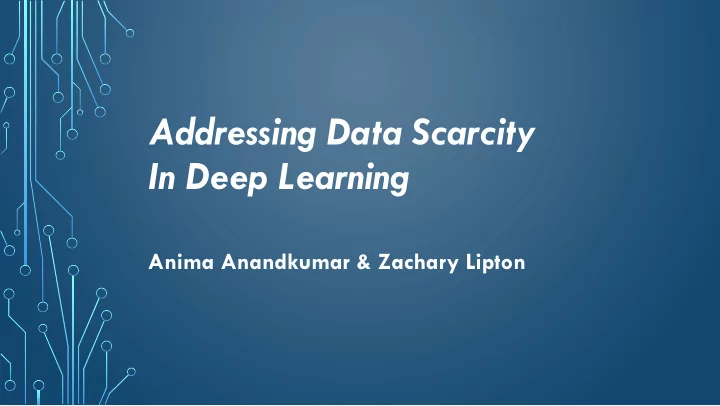

Addressing Data Scarcity In Deep Learning Anima Anandkumar & Zachary Lipton
DATA AUGMENTATION • To improve generalization, augment training data. • In computer vision. Simple techniques: rotation, cropping, noise • In speech recognition: Additive background noise and spectral transform • More sophisticated approaches ?
PREDICTIVE VS GENERATIVE MODELS P(y | x) P(x | y) y y x x • Impressive gains with deep learning • Far more challenging • Information loss (domain of y << x) • Need to model latent variations
DATA AUGMENTATION 1: MIXED REALITY GAN Merits GAN Peril • Captures statistics of • Quality of generated images not high natural images • Introduces artifacts • Learnable Synthetic Data Peril Merits • High-quality rendering • Domain mis-match • Rendering for visual • Full annotation for free appeal and not • Generate infinite data classification Our GAN-based framework – Mr.GANs – narrows gap between synthetic and real data
MIXED-REALITY GENERATIVE ADVERSARIAL NETWORKS (MR-GAN) Tan Nguyen, Hao Chen, Zachary Lipton, Leo Dirac, Stefano Soatto, A.
MIXED-REALITY GENERATIVE ADVERSARIAL NETWORKS (MR-GAN) • Two domains X and Y. • CycleGAN: Transforms from domain X to Y and viceversa. • Enforcing Cycle consistency: F(G(X)) ~ X. • MR-GAN: Progressive CycleGAN
MIXED-REALITY GENERATIVE ADVERSARIAL NETWORKS (MR-GAN)
CLASSIFICATION RESULTS ON CIFAR-DA4 1million synthetic from 3D models. 0.25% real from CIFAR100. 4 classes. Improvement over training on real data: • Real + Synthetic: 5.43% (Stage 0) • Real + CycleGAN: 5.09% (Stage 1) • Real + Mr.GAN: • 8.85% (Stage 2)
THE REAL, THE SYNTHETIC AND THE REFINED Real Synthetic Refined Synthetic Refined Real Mr. GAN pushes both real and synthetic images closer to one another
(R-S): SYNTHETIC -> REFINED SYNTHETIC Synthetic Refined Synthetic
(R-S): REAL -> REFINED REAL Real Refined Real
PREDICTIVE VS GENERATIVE MODELS P(y | x) P(x | y) y y One model to do both? x x • SOTA prediction from CNN models. • What class of p(x|y) yield CNN models for p(y|x)?
LATENT-DEPENDENT DEEP RENDERING MODEL (LD-DRM) Nhat Ho, Tan Nguyen, Ankit Patel, A. , Michael Jordan, Richard Baraniuk
LATENT-DEPENDENT DEEP RENDERING MODEL (LD-DRM) object category Design joint priors for latent latent variables based on intermediate variables reverse-engineering CNN rendering predictive architectures image
LATENT-DEPENDENT DEEP RENDERING MODEL (LD-DRM)
LATENT-DEPENDENT DEEP RENDERING MODEL (LD-DRM)
LATENT-DEPENDENT DEEP RENDERING MODEL (LD-DRM)
STATISTICAL GUARANTEES FOR THE LD-DRM Training loss in the CNNs equivalent to likelihood in LD-DRM • Generalization for prediction depends on the generative model • Better generalization when no. of active rendering paths minimized • Rendering path normalization: new form of regularization • Improves performance significantly.
SEMI-SUPERVISED LEARNING RESULTS Error rate percentage on CIFAR-10 Error rate percentage on CIFAR-100 LD-DRM achieves comparable results to state-of-the-art SSL methods
DATA AUGMENTATION 3: SYMBOLIC EXPRESSIONS Goal: Learn a domain of functions (sin, cos, log, add…) • Training on numerical input-output does not generalize. Data Augmentation with Symbolic Expressions • Efficiently encode relationships between functions. Solution: • Design networks to use both: symbolic + numerical
COMMON STRUCTURE: TREES • Symbolic expression trees. Function evaluation tree. • Decimal trees: encode numbers with decimal representation (numerical). • Can encode any expression, function evaluation and number.
STRUCTURE : TREE LSTM
RESULTS: EQUATION COMPLETION & FUNCTION EVAL
RESULTS: EQUATION VERIFICATION Generalization to unseen depth
RESULTS SUMMARIZED • Vastly Improved numerical evaluation: 90% over function-fitting baseline. • Generalization to verifying symbolic equations of higher depth LSTM: Symbolic TreeLSTM: Symbolic TreeLSTM: symbolic + numeric 76.40 % 93.27 % 96.17 % • Combining symbolic + numerical data helps in better generalization for both tasks: symbolic and numerical evaluation.
CONCLUSION Data scarcity needs to be addressed in a number of ways • Collection: Active learning and partial feedback • Aggregation: Crowdsourcing models • Augmentation: • Graphics rendering + GANs • Semi-supervised learning • Symbolic expressions
Thank you
Recommend
More recommend